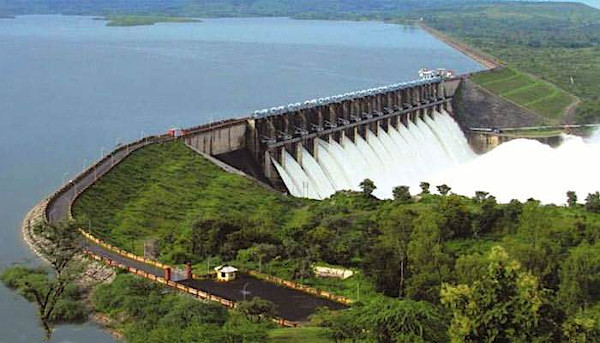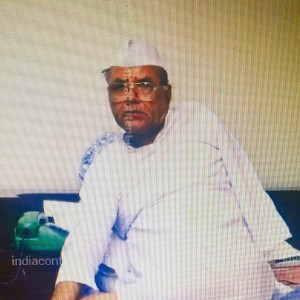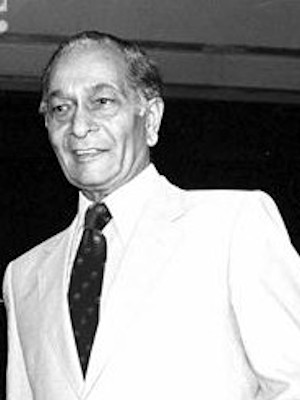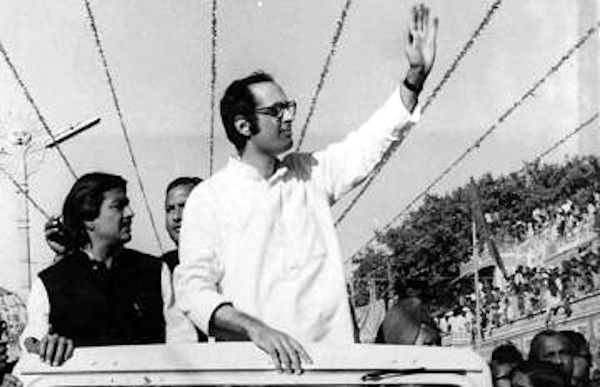Latest Contributions
Read More Contributions
And finally the Interference

I. C. Srivastava was born in 1943. A student of English Literature, he joined the Indian Administrative Service in 1966. During his 37 year tenure, he served as Collector/ District Magistrate of three districts, rising to the position of Chairman, Board of Revenue, Rajasthan.
Shri Srivastava worked as Secretary/Principal Secretary of as many as 17 Rajasthan State Departments, including Revenue, Irrigation, Education, Culture, Tourism, Sports, and Women & Child Development Department. He retired as Chairman, Rajasthan State Mines and Minerals Corporation.
Shri Srivastava has authored several books on Administration & Current affairs in Hindi and English. Nowadays, he is associated with various social and cultural voluntary organisations in Jaipur.
Editor's Note: This is the fourth part of a series on life as an IAS officer by Shri I. C. Srivastava. The first part is Memorable and Useful Experiences as an IAS officer, the second is Interface with and Interference by Political Masters, and the third is Interface with political leaders: Shri Barkatullah Khan and Shri C.M. Baid.
So far I have dwelt on my interface and support with the top political leaders of the state. Coming to interference part, I can recall three-four illustrative cases/incidents which would bring forth, hopefully, the nature and purpose of uncalled for directions nearly always oral, at times subtle, but sometimes blunt and sharp edged.
An administrative adage, “reputation of the officer travels before him” always helped me overcome my apprehensions about the fallout of my transparent and clear decisions based on ground realities and the human side. An administrator has to appreciate and appraise not only the facts of each case or situation but his keen insight into the human aspects implicit or embedded therein should nearly always throw up the correct decisions to make him a successful officer. The saying “nothing succeeds like success” is the oft-repeated and accepted cliché in bureaucratic circles.
I came across the first case of political settlement by intervention at the top level when I was asked to negotiate as Director, Kadana and Mahi Bajaj Sagar Rehabilitation (of oustees) Project in a series of meetings with officers of Gujarat Government and members of Mahi Control Board.

Mahi dam on Mahi river
A detailed account of the divergence between the norms approved for rehabilitation of oustees of Gujarat and Rajasthan by their respective governments resulting into protracted negotiations at administrative levels has been related in the case study, “The Belated Agreement” included in my book Challenge and Change in Administrative System
However, the point that I wish to be emphasize here is that Rajasthan State lost time and opportunity for resettling the predominantly tribal oustees of the two dams, living in Banswara and Dungarpur districts due to sheer lack of political will and obduracy at the bureaucratic levels resulting from exaggerated norms which were not agreed to by Gujarat Government for a long time.
Matters came to a head just before the Emergency was declared as it dawned upon the State Government that time was running out, both for the agreement with Gujarat and execution of rehabilitation work which had already been completed in Gujarat long back.
As against the initial amount of over Rs. 16 crores, Rajasthan Government under people’s pressure wanted to strike a compromise at Rs. 12 crores against which Gujarat offered Rs. 4 crores.
Finally, on May 29, 1975, Shri Jagjivan Ram, Union Minister of Irrigation presided over a meeting attended by the then Rajasthan Chief Minister Shri Hari Dev Joshi and Shri H.C. Sarin, Governor of Gujarat which was, then, under President’s rule.

Former Chief Minister of Rajasthan, Shri Hari Dev Joshi
After a three hour discussion preceded by the presentation and exposition of the problem by me as Director, Resettlement, an agreement was signed on that ‘fateful’ day—fateful because it sealed the fate of 7,000 families who had been living till then only on promise of a bright future.
A bargain was settled at Rs. 8.10 crores and this amount excluded the cost of Ring Wall for the Muslim Shrine at Galiakot, which was additionally, to be borne by Gujarat. It may be recalled that an unclear agreement barely outlining the principles and terms for future action had been signed between Irrigation Ministers of the two states in 1966. Both agreements signed at the political level illustrate the uncharted course of protracted negotiations to solve an inter-state problem resulting into inordinate delay and loss of time for both sides.
Lives of thousands of simple, tribal people remained in ‘suspended animation’ for nine long years due to lack of political and administrative will to settle a human problem expeditiously. Finally, sheer strong political will at Chief Minister’s level alone settled the pending issues.

Former Governor of Gujarat, Shri H. C. Sarin
This political intervention did not come too soon but when it did it took only three hours to bring about the long awaited compromise and agreement. The pivotal role of the sagacious Shri Jagjivan Ram, the then Union Minister cannot be overemphasized. For it was he who insisted that agreement should be reached in that one meeting.
The object lesson for administrative officers seems to lie in assessing the popular upsurge based on ‘felt’ needs, which in turn, would engender political will of a high order. Senior bureaucrats need to prepare fully with lots of home work to lay the ground work for reaching a settlement.
The second episode relates to a politico-cum-protocol issue arising from a well-publicized, high-profile visit of Sanjay Gandhi to Bikaner early in 1976. The VVIP treatment he had received a few days earlier in Haryana had set the tone. That set the norm for future visits by Sanjay wherever he went. The curious rural crowd was expected to turn up in large numbers to attend the public meeting scheduled to be addressed by him with his new found ‘mantra’—“Batain Kum Kaam Jyada”. He had already begun to be addressed as the new leader of young India, an icon for the surging crowds.

Sanjay Gandhi
Briefly, the security issues for the State CID were reduced to two demands: provision of two white Ambassador cars from the State Garage and a temporary telephone connection below the rostrum generally provided for the security of the Prime Minister on official visits.
Being Deputy Secretary of General Administration Department (GAD) I also functioned ex-officio as State Protocol Officer. In that capacity I was required to maintain and observe protocol. For the Youth Congress leader that Sanjay was, he did not figure in the order of precedence or the State Guest list.
In fact his position did not figure in the list at all. When DIG, CID rang up as a follow up to the letter of requisition for two cars and a temporary telephone as aforesaid, my initial reaction was a point blank ‘no’. But IGP Shri Ganesh Singh also tried to contact me. Little realizing how to duck the issue, I made myself unavailable for a while. But, Mr. O.P. Tandon, DIG came to Secretariat personally looking for my location.
I, then, decided to seek the guidance from the Chief Secretary, Shri M. Mukerji, who was also ex-officio Secretary, GAD. As he could be available at 6 p.m., I requested Mr. Tandon to contact me at 6.30 p.m. on the eve of the so called VVIPs’ visit. Shri Mukerji, a highly experienced bureaucrat who found an easy administrative solution to a political-protocol problem, which had eluded me.
“Yes, Srivastava! What is it that is bothering you?” he asked.
On my explaining to him the problem as precisely and briefly as possible, he exclaimed, “It is not a big problem! You see the Police Department has sent you the requisition. Allot two vehicles to the Police Department as well as a temporary telephone for security duties. While the vehicles will be on security deployment, the Police Department will be responsible for paying the bills to Telephone Department for installation and call charges of telephone from their own budget, as GAD only allots telephones even otherwise.”
What a great relief it was to me to have found a quick solution to a troublesome problem.
Even though press censorship had been relaxed by then, the Fourth Estate would not have taken notice of VVIP facilities provided to Sanjay Gandhi as he had grown larger than life in stature and estimation. But I was on my bureaucratic alert and wished to maintain strict neutrality in relation to Congress Party programmes.
However, with extra expenditure Circuit House was spruced up and extra facilities were provided, which added to the comfort of stay for senior officers and ministers later on. I remember vividly how the then Collector, Bikaner walked into my room with a proposal for extra budget provision for Circuit House made a personal request to forward the same immediately to Finance Commissioner who was waiting after office hours to approve the same. This would ensure that the purchases made that day could be backed up by government’s administrative approval and financial sanction of the funds.
All is well that ends well also found application in this episode which brings forth and confirms my view that administration is an art of the possible and cannot be hide bound in a set of unimplementable rules. These rules and regulations are formulated for the management of men and matters and their enforcement can be an end by itself to serve public interest which has to be gauged every hour day in and day out.
Another episode relates to my first tenure as Secretary to Government in the Department of Tourism, Culture and Sports during the period 1984-86. As part of new Tourism Policy on the anvil the department had decided to launch a publicity campaign estimated to cost about Rs. 5 lakhs to project the newly identified tourist circuits of Marwar and Mewar regions.
Four firms were short listed based on their two-in-one technical and financial bids as per the prevailing norms. One of the firms came out as the brightest and the best during deliberations in the Selection Committee headed by me.
While the Committee’s recommendations were under process in the office of Director, Tourism for submission to Minister, I got a call from the office of the Minister, Tourism and Culture who appeared to be not only close to the then Prime Minister, Shri Rajiv Gandhi having studied in the same school or college as PM did, but was also acclaimed as a dilettante of fine arts and a culture. His royal descent also shaped his popularity and a high reputation.
His royal descent also ensured flow of high class upbringing, lots of learning of fine arts and varied interests. His overbearing personality was reflected in his swagger at the shoulders, at times it was scary enough for the coterie surrounding him but not for your humble writer who was, then, as now, proud to be a disciple of the great disciplinarian Director of Training at the National Academy, Mr. M.G. Pimputkar.
The Minister knew from his own sources that the committee had finalized its recommendations in favour of the best among the four publicity firms. He did not broach the subject straightway. Instead, he took out from his drawer and showed me the resignation letter of the Chairman, RTDC, a political appointee whose primary qualification was to be a Kashmiri Brahmin who had easy access to Mrs. Indira Gandhi’s office-at-home thanks to his proximity to one of the private secretaries to the Prime Minister. Both the Minister and the Chairman, RTDC had an inflated ego and hence those coming in contact with them had to take extra care to satisfy their ego. In the Chairman’s case, his egotism had to be pacified by patient listening.
“Mr. Srivastava, do you know I had obtained this resignation letter from Mr. Kak the day I had become Minister. But today I have conveyed my acceptance which you must have read in newspapers” (Mum was the word besides a non-nonchalant nod from me). Now about the publicity campaign: I understand you are in the process of finalizing your recommendations for submission to me.”
“Yes, Sir, we have already finalized and selected the best among the four building firms. The file will reach your office by this evening or tomorrow at the latest.”
“Mr. Srivastava, I want to tell you that there is a reference from PM’s house about the firm... (name forgotten obviously for good). Therefore, this firm should be given order, you know!” The Minister blurted out in one flow.
To this my reply was, “Sir this firm has no experience at all, not even worth the name. In presentation, its representative showed a small poster for a shoe company and an invitation card printed by it! Obviously I cannot go against committee’s findings and recommendations.”
“You can go Mr. Srivastava. I think we have to part company also”. A loud and clear message from the “horse’s mouth” so to say and thus I got the hint that I should be prepared to move to another department as soon as possible.
However, my transfer and exit from Tourism & Culture Department came about in a rather unexpected manner. Shortly after my encounter with the Minister, I was deputed for one month Training on Policy in Government at Indian Institute of Public Administration, New Delhi, which had been notified earlier.
But towards the end of this training, i.e., in the last week of December 1985, I received a call from the Chief Secretary who in his rather mellow, sweet and almost muffled voice told me, I suggest you should take some leave in continuation of your present training as your Minister has requested for a change. I know it is not your fault, “Par woh peeche pad gaye hain kya karun”.
I replied, “I would not like to waste my earned leave for this, Sir! I was expecting this change already. Hence you may like to post me in any department for which you consider me suitable”.
“You know, Srivastava, in that case I have to send the file to Bombay for the approval of CM who is attending the Plenary Session of Congress. I don’t want to bother the CM there, you know”.
“All right, Sir. As you wish, I will comply as I do not want to put you to inconvenience for this purpose”, was my spontaneous reply.
I applied for a fortnight’s leave and before this was over, the press announced the change in my posting. A few days later I was transferred and posted as Desert Development Commissioner at Jodhpur.
But before the end of another fortnight, the Chief Minister announced in a Press Conference that he had dropped the Minister and his resignation had been forwarded to Governor for acceptance.
My unceremonious exit from my first department as Secretary which I came to like because of my background and study of history and monuments of Rajasthan was followed by the Minister’s removal which reflected a crude contrast to the claim he had made to me about his proximity to PM’s house.
God alone or the two political masters themselves would know the real reason for his being dropped from the Council of Ministers.
I joined my duties at Jodhpur leaving behind my family at Jaipur for the first time in my career. Before that I met the CM to represent my case. But he maintained a stiff upper lip.
Of course, the Chief Secretary had assured me that he would get me posted out of Jodhpur as soon as possible after the ensuing Assembly session was over. My luck again seemed to run out, for the Chief Secretary Shri Naresh Chandra was suddenly sent to Jammu and Kashmir as Adviser to Governor.
But I did not lose heart and spoke to Shri V.B.L. Mathur, the new Chief Secretary who assured me that I would be posted back to Jaipur after the Assembly session. It seemed, he knew the whole case from his own sources or his predecessor who must have briefed him.
I came back to Jaipur after 90 days (of which 46 days were spent on tour of desert and other districts) and took over charge as Secretary, Social Welfare, Women and Child Development in the last week of May 1986. I really enjoyed my tour of the Thar and learnt a great deal about the lives of people living in such harsh conditions and terrain.

Thar desert
I remained in the Secretariat at Jaipur for nearly three years from May 1986 to January 1989. In January 1989 I was transferred as Chairman, Rajasthan Civil Services Tribunal and the same year in July I was, again, transferred as Divisional Commissioner, Jaipur. During this period July 1989 to 1991, Jaipur witnessed two major riots the first one in Shastri Nagar and the other in Ram Ganj area—the latter spread to Johari Bazar and other areas too.
Fatehpur, in Sikar District, witnessed communal riots as a result of slogan shouting and stone pelting by miscreants on the Moharrum procession from roof top of a temple. As a result, some shops were damaged.
This incident has been recorded in detail in the book Challenge and Change in Administrative System under the title “The Communal Conflicts: A Challenge for Administration”. Riots were mainly the result of buildup of heightened tension arising from Ramshila Pujan, i.e., the purification of bricks made for new Ram Temple proposed to be built at Ayodhya before they were to be dispatched for construction.
A one-man Enquiry Commission headed by Justice N.L. Tibrewal was appointed to enquire into the riots that took place in Jaipur. A number of measures were recommended by the Commission for action by government as well as officers. The interaction and nexus between political cadre and communal elements has been a subject of study by many authors and in the reminiscences of this nature, it is neither necessary nor possible to throw light on this matter.
Conclusion
To conclude expectations of citizens from government always remain high, unlike customer satisfaction in goods and services and thus it will be difficult to bridge the chasm between people's expectations and experience in the public services rendered by civil servants.
Nonetheless, of late, public service delivery systems of governments have been thrown wide open for fresh winds of New Public Management to factor in transparency, accountability and responsiveness so as to bring about necessary change in paradigm and dynamics of public administration in order to enable it to meet new challenges posed by liberalization, competitiveness and the need for public private partnership in the new emerging scenario.
Comments
Thanks InOurDays
No words to thank the webzine www.inourdays.org for the pains taken the Editor to make my reminiscences cherishable .
Much awaited but finally this rounds up my memorable and useful experiences initially penned down for trainee officers of IAS and Rajasthan Administrative Service ( RAS )
Admin history
Very good to read these stories. I suspect that now there is much more interference.
Your treasure of experiences
Your treasure of experiences well shared from time to time, always create an insight and redefines my perspective towards the system.
Stories by Shri Srivastava
Shri I C Shrivastava ji is my respected family friend since 1984. I have always been proud of his literacy, his working style and intelligence . His dedication for the cause he champions is to be admired .
Besides , he’s social worker for his dedicated issues . I always need his guidance and blessings for me and the family . I hope he keeps on writing many more motivational articles like this one .
In fact I am inspired by his words of wisdom and blessed by him. MAY GOD CONTINUE TO SHOWER HIS BLESSINGS FOREVER . Dear Sir . Many thanks for your friendship .
Simply marvellous, lot to
Simply marvellous, lot to learn from the working style of Shrivastava Sahab. He is not only a wonderful person but also an excellent administrator. I have learnt a lot from him in my short association with him as Chairman of Transparency International India and today after going through this write up by him about his experience about his career and I am sure that it will be very helpful for new comers in the administrative services of the country. His contribution is praiseworthy. I always admire him.
Add new comment